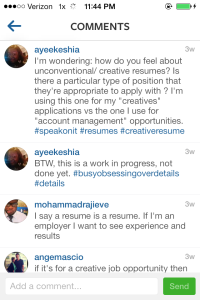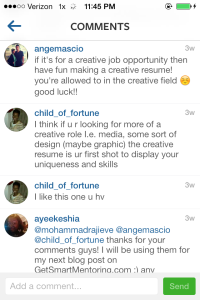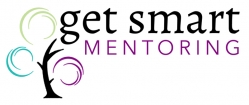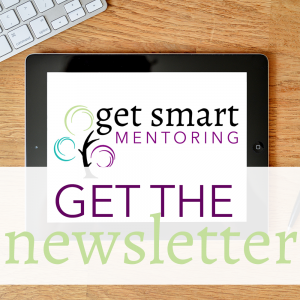Hey Ladies!
I want to start the Interview Ready Series (IRS-haha) reminding you that probably one of the most important aspects of going through this process is that you find the confidence in yourself, in your abilities, and in what you have to offer. Confidence can be clearly displayed in the way you present yourself on paper with your resume and cover letter, via online communications with your netiquette, and in how you present yourself in person. This post is going to focus on the first step, your resume. Here are some tips and best practices in crafting that resume.
1. Start with your name prominently displayed at the top.
2. Continue through with pertinent information such as your address, phone number and email. Include social media information if you have a strong web presence and often mention things that have to do with your prospective industry. Usually, this would be a Twitter handle.
*After this some applicants like to include an objective. If you choose to do so make sure it is 1-2 sentences that are succinct and really capture the essence of the type of position they are applying for.
3. Follow this with your education history. Include special honors, awards, scholarships and your GPA if it is over a 3.0. Some people suggest that for certain industries, only include a GPA if it is over 3.5 so do further research to see if that’s you. This is also a great place to include any relevant coursework that you feel pertains to the job you are applying for.
4. Now begin to list your relevant work/internship experience. Include the name of the business, your position, and the dates of your services, usually signified by month and year. It can also be helpful to include the city and state of where the position was located. Following this, list 2-3 bullet points of the tasks that you did that most match the types of positions your applying for. Be sure to mind your tenses and use the STAR approach: Situation, Task, Action, Result. Also remember to begin each point with an action verb. Here are resources that list some great ones. Words like: activated, improved, budgeted, planned, prepared, and executed, are all examples of impactful words that when included in a resume,
5. Continue this process including those work experiences that you feel most closely match the job your applying for. Leave off some positions and save them and their descriptions elsewhere to be able to tailor your resume to certain positions. Remember, although you are leaving these off of your resume, you may have the opportunity to bring them up and talk about them in the interview process.
6. You can end you resume listing skills or interests that would make you a more attractive candidate for the position. Things like fluency in other languages and computer programs you’re comfortable with can be great speaking points in an interview and help to leverage you against your competition.
Some final pointers for crafting that perfect resume:
*Save as PDF to preserve formatting. SPELL CHECK. Make sure you use parallel sentence structure. All the same font and consistent sizing throughout. If running out of room, work on spacing and margins. Use elements such as break lines and capital lettering to help the reader follow along.
*When printing hard copies use a thicker cardstock to help yours stand out among the rest. I’m often complimented on my resume’s physical appearance. It appeals to another one of the 5 senses: touch. I use an inexpensive cream cardstock from Staples that comes in a pack of 200, so breaking the bank is unnecessary for a small upgrade.
*Know that your resume will change and that is okay. It will be a constantly changing document, this a great opportunity to become comfortable with change.
For some more creative industries, several applicants have also crafted creative resumes to showcase some of their skills and eye for aesthetics. I conducted a quick poll on Instagram asking users what they thought about creative resumes. Here’s what they had to say:


I enjoy having both types of my resumes, creative and professional ready to apply to whatever position that catches my attention. Think outside the box and see what you could come up with!
A preclude to my next post: Many people have asked about cover letters and how to get over the hurdle of writing one. Trust me, you’ll be glad to have one once you take the time to craft it. Cover Letters become a powerful representation of yourself, your ability to write professionally and eloquently, and your ability to articulate what makes you special as a candidate. Once you’ve written your cover letter, you’ll only have to make minor changes as you apply to different positions. Stay tuned for that post next in the IRS!
**If you have any specific questions feel free to contact me at keshia@jpresidentialcb.com, I’d love to help!
With Love, Keshia Mae








Leave A Comment